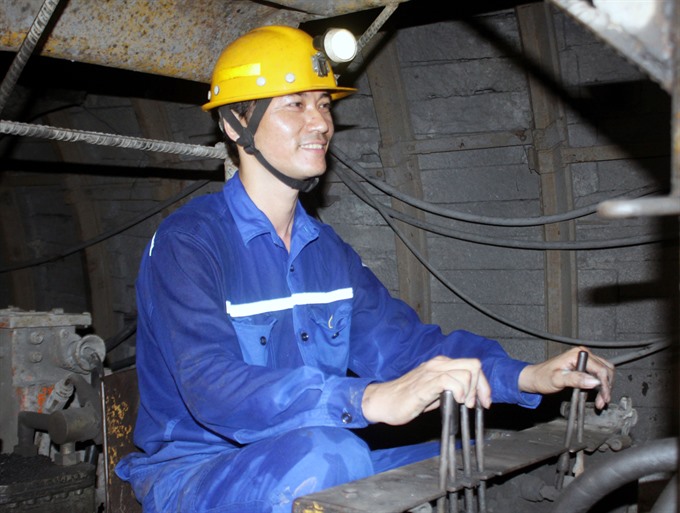After 10 years as a coal miner in northern Quang Ninh Province on a monthly income of about VNĐ10million (US$435), Tran Van Phong from northern Hai Duong Province decided to go back to his hometown and take up a job as a delivery man.

A worker working in an underground coal mine in Quang Ninh Province.
“The VNĐ3-4 million ($130-174) a month I get now is much less but the work is more satisfying,” he said.
Phong is among thousands of coal miners who have abandoned work in Quang Ninh Province in recent years.
Companies in the Viet Nam National Coal and Mineral Industries Group (Vinacomin or TKV) are facing the harsh fact that miners are losing interest in the back breaking work.
Worker shortage in the risk-packed job has reached an alarming rate.
According to Vinacomin, last year, more than 1,121 miners quit their jobs. The number of dropouts surged to 1,136 in just the first six months of this year.
However, according to the Labour newspaper, the real number is larger among the 17 mining companies in operation in Quang Ninh Province.
Trinh Ngoc Toan, president of the labour union at Ha Lam Coal Joint Stock Company said that as many as 423 workers stopped working last year, including dozens who retired.
To date, the company has only recruited 181 miners to replace them. In the first eight months of this year, the number hit 334 people while only 120 miners were newly recruited.
Recruiting efforts have become desperate. Vàng Danh Coal Company planned to recruit 300 workers in 2016 but so far has only found 80.
According to Vu Van Thinh, director of Vinacomin’s job recruitment school, each company needs to recruit 3,500 to 4,000 miners to meet productions demands.
“The school’s recruitment plan for this year is 3,800 students, but we have so far recruited only 1,800,” Thinh said.
The coal mining sector needs a huge force of 7,000 to 9,000 miners and electrical and mechanical underground workers to produce 42 million tonnes of coal used for commercial purpose each year.
Thinh and other staff at Vinacomin’s job recruitment and introduction centre have just returned from the northern mountainous province of Cao Bang to recruit more students. In recent years, worker sources from the northern delta have dried up so recruiters must travel to remote mountain areas and down to the central provinces of Quang Tri, Quang Binh to hire workers.
In previous years, workers from Quang Ninh Province accounted for most miners. Miners from northern delta provinces who once made up 60 per cent of the total now accounts for less than 30 per cent.
With the recruitment effort in mountainous areas, the number of workers from ethnic minority groups has increased to about half of the total.
In spite of free training and accommodation offered by the school and wages of VNĐ10 million a month, the school and authorities still face difficulties.
“Some students want to go home to get married, according to their parents’ demands. We must persuade not only students, but also parents,” Thinh said.
Others dropped out of school as they were scared of mines. Some dropouts led to the departure of whole groups, Thịnh said.
“Students tell each other about mining dangers and hardship. Everyone is discouraged by the inappropriate living environment, despite high wages,” a leading official of Cam Pha Coal Company told Labor newspaper.
About 10 years ago, being a miner was considered “hot” job, but now many young people refuse to take the job or just do the job for short periods and go back to their hometowns.
A leader of a coal company told Labor that the average wage of a miner, even a newcomer, could reach VNĐ20million per month because income was based on productivity”. However, he admitted the job was dangerous.
In rural areas now, there were more job opportunities in industrial parks and factories.
Yesterday, two miners were buried in a coal mine accident in Cam Pha City, Quang Ninh Province.
Local authorities aare now offering work opportunities for wives and girlfriends of miners in Quảng Ninh Province so that miners are more likely to settle down for life.
At a recent general conference of coal sector, Le Minh Chuan, Chairman of the Board of Members of Vinacomin Group, proposed strengthening mechanisation to reduce the heavy work done by miners and to increase productivity.
VNS